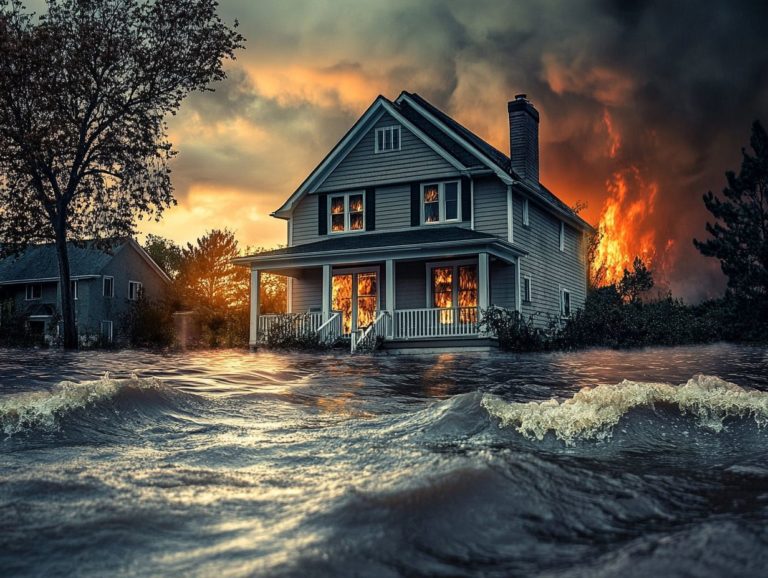Liability Coverage in Home Insurance Types
Understanding the different types of insurance is essential when it comes to safeguarding your home.
Home insurance can be complex, and one of its most crucial elements is liability coverage. This guide will break down the various forms of home insurance, with an emphasis on liability coverage what it entails, why it s important, and how to select the right type for your needs.
From personal liability to medical payments, you ll explore the factors that influence coverage. This knowledge empowers you to make informed decisions. Whether you re a seasoned homeowner or entering the market for the first time, this information will provide valuable insights to ensure your home is well protected.
Contents
- Key Takeaways:
- Understanding Home Insurance Types
- What is Liability Coverage?
- Types of Liability Coverage in Home Insurance
- Factors Affecting Liability Coverage
- Location, Home Value, and Personal Factors
- Choosing the Right Liability Coverage
- Common Coverage Exclusions
- Frequently Asked Questions
- What is liability coverage in home insurance types?
- Why is liability coverage important in home insurance?
- What does liability coverage typically cover?
- Are there different types of liability coverage in home insurance?
- Is liability coverage included in all home insurance policies?
- How much liability coverage do I need for my home insurance?
Key Takeaways:
- Understand home insurance types to protect your home and assets.
- Liability coverage protects you from legal and financial responsibilities for injuries on your property.
- Consider location and personal factors when choosing liability coverage.

Understanding Home Insurance Types
Understanding the various types of home insurance is vital for homeowners, renters, and condo owners alike. It provides crucial protection against unexpected events that could lead to significant financial loss.
Homeowners insurance typically covers property damage and personal liability, while renters insurance protects personal belongings and liability for accidents in the rental space.
Umbrella coverage offers extra protection that goes beyond standard policies, giving you additional financial security.
It s important to grasp the nuances of each insurance type to make informed decisions that meet your specific needs.
What is Liability Coverage?
Liability coverage is a cornerstone of your insurance policy. It offers financial protection against claims that arise from bodily injury or property damage caused by you, your household members, or even your pets. To understand more about different protections available, consider learning about types of home insurance coverage. This coverage is essential for safeguarding your assets as it helps cover legal costs and medical expenses from such incidents.
By understanding the specific terms and coverage limits of your liability insurance, you can navigate claims more effectively and ensure adequate financial protection.
For example, if a guest slips and falls on your property, your liability coverage would cover their medical bills and any legal fees that could arise if they pursue damages.
Common claims might include:
- Car accidents
- Dog bites
- Accidental damage to a neighbor s property
It s crucial to understand your coverage limits. Exceeding them can create financial gaps, leaving you vulnerable to significant expenses. Be sure to check for exclusions in your policy, as these could jeopardize your coverage during critical times.
A thorough review of your liability insurance isn t just advisable it s essential.
Types of Liability Coverage in Home Insurance
Home insurance policies often offer various liability coverage options to protect you from unexpected expenses arising from accidents or injuries on your property. It’s important to be aware of understanding the limits of home insurance types to ensure you have adequate protection.
Personal liability coverage safeguards against claims related to bodily injury or property damage caused by you or members of your household. Medical payments coverage addresses medical costs incurred by guests injured on your premises, regardless of fault.
For added security and peace of mind, explore additional liability coverage options to enhance your protection against unforeseen circumstances.
Personal Liability Coverage
Personal liability coverage is an essential element of homeowners and renters insurance policies, designed to offer you financial protection against claims stemming from unintentional injuries or property damage that you may cause to others. To understand more about this aspect, you can read about what is home insurance liability. This coverage serves as a safety net, helping you navigate legal claims and potential lawsuits that could impose significant financial strain.
By grasping the details of personal liability coverage and its place within your overall insurance strategy, you can ensure you re well-protected in the event of accidents on your property.
Consider a scenario where a guest trips and falls during their visit, or perhaps your neighbor s property sustains damage during a backyard gathering. This coverage steps in to manage the claims that could arise from such incidents. It also extends beyond your home, covering situations like an accidental injury caused by your pet or a mishap involving outdoor equipment.
Given life s unpredictable nature, having adequate coverage limits is paramount. Insufficient limits might leave you vulnerable to personal financial risks. Therefore, making informed insurance choices is not just wise it s a fundamental aspect of responsible homeownership.
Medical Payments Coverage

Medical payments coverage is a crucial component of homeowners insurance, covering medical expenses for guests injured on your property, no matter who s at fault. This type of coverage offers you peace of mind, allowing you to address medical bills swiftly without the burden of unexpected financial strain.
Understanding how medical payments coverage functions and its impact on claims helps you make informed choices about your insurance policy. It typically encompasses a broad spectrum of medical expenses, from hospital stays and surgeries to ambulance services, which can escalate quickly in the event of an accident.
Unlike personal liability coverage, which activates when you re deemed responsible for injuries or damages, medical payments coverage steps in regardless of who is to blame, offering immediate relief. For example, if a friend trips and falls during a visit, having this coverage means you can handle their medical expenses without financial anxiety.
These scenarios underscore the importance of incorporating medical payments coverage into your overall insurance strategy. This coverage helps you protect against unforeseen accidents while promoting a welcoming environment without trepidation.
Additional Liability Coverage
Additional liability coverage, often known as umbrella insurance, provides an extra layer of financial protection beyond what standard homeowners or renters insurance can offer. Umbrella insurance is extra coverage that kicks in when your standard policy limits are reached.
This type of coverage is particularly beneficial if you have significant assets, as it helps protect you against large claims that might exceed the limits of your standard policy.
By investing in additional liability coverage, you can enjoy peace of mind, knowing you re better prepared to manage unexpected legal costs, bodily injury claims, and property damage assessments that could threaten your financial stability. With umbrella insurance, you can feel secure knowing you re covered against huge claims!
This enhanced coverage becomes essential in various situations, whether you re hosting social gatherings, engaging in recreational activities, or even when a pet accidentally causes harm.
The cumulative impact of these unpredictable occurrences emphasizes the need for comprehensive protection, especially for those who face higher-than-average risk factors, such as frequent travelers or owners of valuable property.
Evaluate your personal circumstances to spot any gaps in your coverage. Umbrella insurance effectively fills these gaps, ensuring you remain shielded against unforeseen incidents that could otherwise lead to significant financial strain. Don t wait consider adding umbrella insurance today to protect your assets!
Factors Affecting Liability Coverage
A variety of factors can significantly shape the liability coverage in home insurance you receive through your homeowners or renters insurance policy.
Consider the location of your property, its overall value, and any personal circumstances that may influence your risk profile. Residing in an area vulnerable to natural disasters or high crime rates can lead to elevated premiums and stricter coverage requirements.
Moreover, the size and value of your home, as well as the presence of household members, including pets, play a crucial role in how your insurance provider assesses risk and determines the liability coverage options available to you.
Location, Home Value, and Personal Factors
Location, home value, and your unique personal circumstances play an important role in determining the type of liability coverage available to you as a homeowner or renter. Understanding homeowners insurance types can help clarify your options. Insurance providers assess risk based on these factors, so properties in high-risk areas might face steeper premiums and fewer coverage options.
The overall value of your home can dictate policy limits. Personal aspects, like the number of household members and pets, also come into play when evaluating your coverage.
For instance, if you’re located in a coastal region prone to hurricanes, your rates might be 20-30% higher than those living in more stable climates. This reflects the increased likelihood of claims. Additionally, households with multiple pets may encounter liability concerns that lead to elevated premiums. Insurance studies reveal that dog bite claims alone have exceeded $800 million annually.
Talk to your insurance provider for customized solutions tailored to your specific risks. This ensures that both your property and personal circumstances receive thorough evaluation for optimal coverage.
Choosing the Right Liability Coverage
Selecting the appropriate liability coverage is crucial for protecting your financial interests and ensuring you re adequately shielded from potential claims and lawsuits.
To make a well-informed choice, assess your coverage needs. Consider the value of your assets, your lifestyle, and any potential risks linked to your property.
A thorough understanding of coverage limits and exclusions within different policies empowers you to choose a liability insurance plan that aligns with your circumstances and provides essential financial protection.
Evaluating Coverage Needs and Limits

Evaluating your coverage needs and limits is a vital step in selecting liability insurance. It ensures you have adequate financial protection against unexpected claims.
Consider essential factors such as the value of your home, your personal assets, and the activities of household members when determining the right levels of coverage. Consulting with an insurance provider can offer valuable insights, allowing you to tailor your liability coverage to your unique situation.
A systematic approach can streamline this process. Start with a checklist that includes:
- Assessing the value of your home
- Calculating your total assets
- Considering activities that may increase risk, such as having a pool or frequently hosting gatherings
Many find it beneficial to use online calculators provided by insurance companies. These can serve as a useful starting point for determining necessary coverage. Engaging in discussions with an insurance provider can reveal possible gaps in your coverage and suggest suitable policies.
This collaborative effort ensures that you not only meet legal requirements but also obtain sufficient protection against unforeseen incidents.
Common Coverage Exclusions
Understanding common coverage exclusions in homeowners and renters insurance is essential as a policyholder. This knowledge helps you avoid surprise expenses when it’s time to file a claim.
These exclusions often relate to specific events or circumstances that standard policies don t cover, such as intentional damage, normal wear and tear, or certain natural disasters.
By familiarizing yourself with these exclusions, you can make more informed decisions when selecting your insurance coverage. This gives you a clear perspective on the extent of your financial protection.
Specific Exclusions to Consider
When reviewing liability insurance policies, pinpoint specific exclusions that could limit your coverage. Common exclusions might include injuries from business activities on your premises, damage from certain pet breeds, and claims arising from failure to comply with local laws.
Knowing about these exclusions helps you understand your policy limits. This knowledge aids in making informed decisions about additional coverage options.
These exclusions can impact your claims significantly. If a guest is injured during an unreported business activity at your home, you could be responsible for their medical expenses.
If you own a high-risk breed of pet, any incidents related to that pet could lead to denied claims, leaving you vulnerable.
To address these gaps, discuss endorsements (additional coverage options) with your agent that cover business-related incidents. Look into pet liability coverage to enhance your protection.
Frequently Asked Questions
What is liability coverage in home insurance types?
Liability coverage protects you if someone is injured on your property or if you damage someone else’s property, making it important to understand the types of coverage in homeowners insurance.
Why is liability coverage important in home insurance?

This coverage provides financial protection in case of a lawsuit due to an accident or injury on your property. Without it, you could pay legal fees and damages out of your pocket.
What does liability coverage typically cover?
Liability coverage usually covers bodily injury, property damage, and personal injury. This includes medical expenses, legal fees, and damages awarded to the injured party.
Are there different types of liability coverage in home insurance?
Yes, different types include personal liability coverage, medical payments coverage, and umbrella liability coverage. For a deeper insight into these options, refer to the article on understanding the perils in home insurance types. Each provides varying levels of protection depending on your insurance provider.
Is liability coverage included in all home insurance policies?
Liability coverage is typically included in all home insurance policies. It’s important to understand liability coverage in home insurance and review your policy carefully to know the coverage limits and details.
How much liability coverage do I need for my home insurance?
The amount you need depends on your assets, risk level, and budget. Discuss your needs with your insurance provider to determine the right coverage for you.






